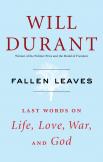An Examined Life
In Fallen Leaves Will Durant, best known for the best-selling History of Philosophy and popular 14-volume History of Civilization, seeks to express “how I feel, now that I have one foot in the grave, about those ultimate riddles I dealt with so recklessly years ago….” including life, love, war, religion and God. He began these reflections in March 1967 and continued working on them until his death on November 7, 1981.
Over 30 years after his death, Durant’s granddaughter Monica Mihell discovered drafts of the manuscript in a box when, after selling her house, she was preparing to move.
Since the book is very short the reflections on these topics are tantalizingly brief. But they remarkably reveal how intellectually alive and alert for a man in his 80s and 90s Durant remained.
I personally experienced this mental alertness. In May 1979 as president of Saint Peter’s College, I flew to Los Angeles to confer honorary degrees upon Will and his wife Ariel. (He was a graduate of Saint Peter’s Prep and had earned bachelor’s and master’s degrees from Saint Peter’s College.) In expressing his gratitude for the bestowal of these degrees Will stood up and at the age of 93 succinctly and eloquently gave a five minute response without using any notes.
Will’s sister Ethel Halliwell, who lived in Westfield, N.J., and with whom I often had dinner, used to visit the Durants in Los Angeles. She told me that she would bring for reading during her visit books by prominent theologians like Hans Küng and Edward Schillebeeckx. Will would grab the books immediately upon her arrival, read them and then tell Ethel that the authors were saying what he used to say.
Durant’s love for Christ is manifest throughout these reflections. This love did not come as a surprise to me, since Will signed his letters to me with this phrase above his name: “Another Lover of Christ.”
Readers will have an interest in knowing the reasoning behind some of his observations. For example, he comments: “Through all the adventures of the mind among philosophies and creeds the figure of Christ remains the most appealing in history.” He later states: “There are in America and Europe thousands of clergymen who are ready and eager for the Christianity of Christ. It is we, the laity, who hold them back, who insist upon our inherited orthodoxies, and who hesitate to sit in the same pew with one whose beliefs differ in any article from our own.”
Durant clearly states his own religious belief: “I am prepared to have you put me down as an atheist, since I have reluctantly abandoned belief in a personal and loving God. But I am loathe to leave the word God out of my life and creed.” He considered himself “a Christian in the literal and difficult sense of sincerely admiring the personality of Christ and making a persistent effort to behave like a Christian.” He goes on to confess: “If I could live another life, endowed with my present mind and mood, I would not write history or philosophy, but would devote myself to establishing an association of men and women free to have any tolerant theology or no theology at all, but pledged to follow as far as possible the ethics of Christ….” He concludes the paragraph with this preference: “I would rather contribute a microscopic mite to improving the conduct of men and statesmen than write the one hundred best books.”
Throughout these reflections the reader comes across profound insights and surprising statements. An example is: “It is one distinction of the twentieth century that while protests against war have mounted, war has become more frequent and extensive, more destructive of life and property than ever before.” An example of the surprising statements is: “I would give academic credit for swimming, baseball, football, basketball and those other lusty games that require and develop more intelligence and character than all the conjugations of Greece and Rome.”
Durant throughout this book does not hesitate to express his convictions directly. Some are blunt. “Since 1921 I have inveighed against the absurdities of psychoanalysis. I laughed at Freud’s dream theories as soon as I read them…. Freud’s resort to symbolism in interpreting dreams seemed to me merely the bizarre and unconvincing feat of a diseased imagination.”
I highly recommend this book. It is a quick and rewarding read.
This article also appeared in print, under the headline “An Examined Life,” in the May 18, 2015, issue.








